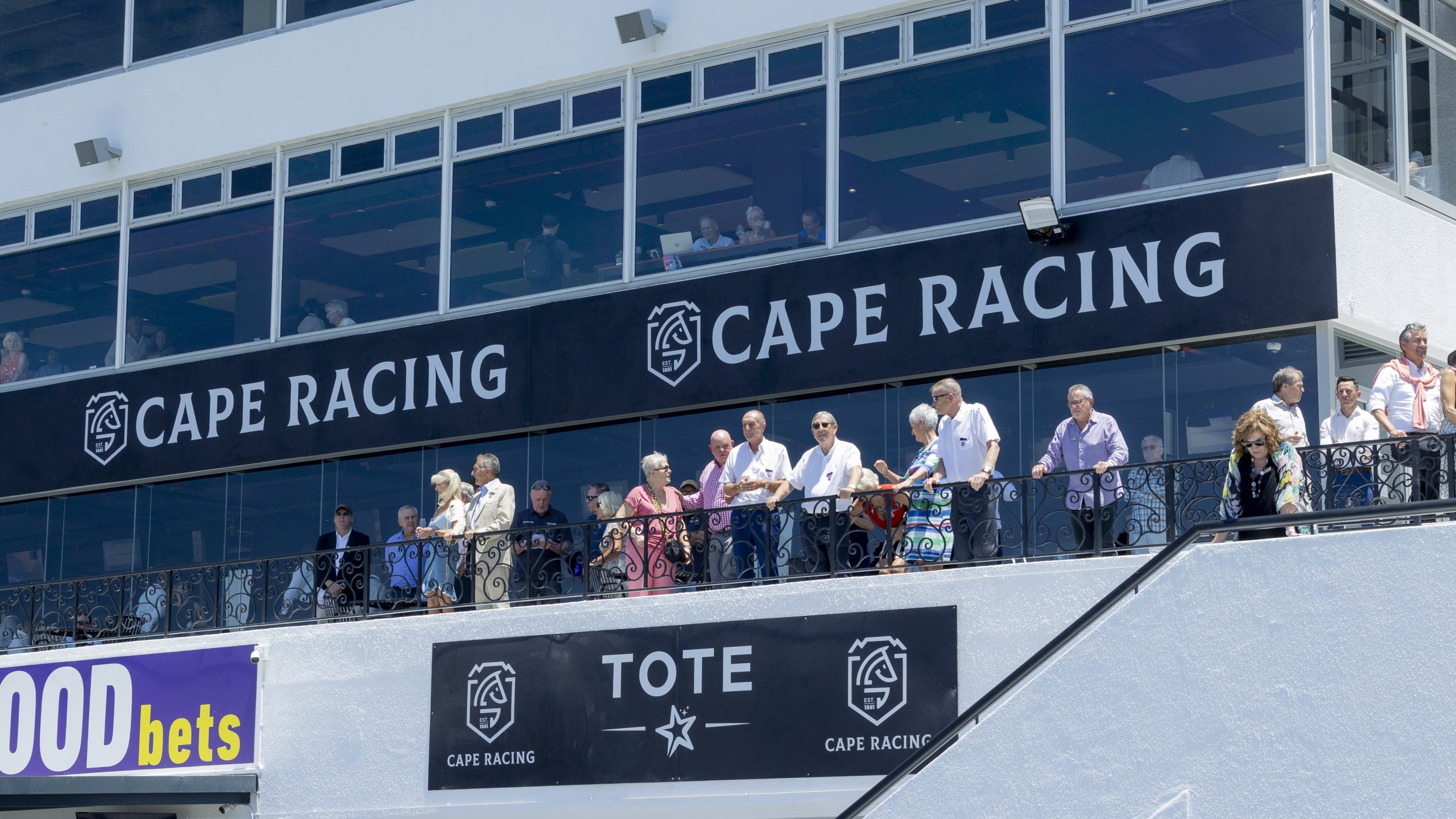The pledge made this week by racing’s rulers to heed the lessons of a number of failings in the crucial area of integrity will be welcome news to the respected Timeform organisation which has issued a stark warning to the sport in their newly published Racehorses of 2015 annual, out this week.

That Wednesday’s announcement from the British Horseracing Authority follows hard on the heels of a BHA promise to divert extra money into battling corruption if the revolution in racing funding comes to fruition can only be to the benefit of a sport which, Timeform point out, now spends £16.4m on integrity, down significantly from a peak of £25m.
“Evidence of corruption in British horse racing is not hard to find – the 12-year ban imposed on once-promising apprentice Darren Egan for ‘stopping’ horses laid by a professional punter isn’t the first such case and it won’t be the last – and racing cannot afford to be complacent,” state Timeform, adding: “It must prove to the public that the sport is run strictly … the trust of racegoers and punters in the integrity of racing, particularly as a betting medium, is fragile at the best of times.”

Aidan O’Brien – excellent record
The biggest scandal in racing in modern times involved a Newmarket yard run by Godolphin and it is that organisation’s travails on the track, coupled with the rise and rise of the rival Coolmore operation, mainly through the exploits of trainer Aidan O’Brien, which are detailed in a number of Timeform’s trademark extended essays on the best equine performers of last year.
O’Brien “has never had a stronger hand in the first two Classics [the 2,000 and 1,000 Guineas at Newmarket]” with Air Force Blue and Minding respectively. Timeform state the trainer “is spot on” to claim Air Force Blue “is the best two-year-old we’ve ever had [at Ballydoyle]”, while Minding was “not only the highest-rated two-year-old filly in 2015, but in fact one of the highest-rated two-year-old fillies trained in Europe in recent decades”.
In contrast, Timeform argue, in their essay on Godolphin’s top-class Tryster, that “the days of Mark of Esteem, Halling, Swain, Daylami, Dubai Millennium, Fantastic Light and Sakhee now seem a long time ago for those who have followed Godolphin since its inception.
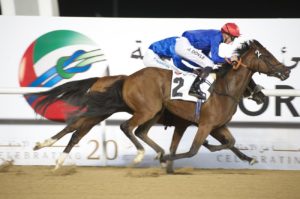 Godolphin’s first period of pre-eminence was founded on quality – Saeed bin Suroor operated originally with a string of 40 or 50 – but in the last decade it has owed its position among Britain’s leading owners to quantity.
Godolphin’s first period of pre-eminence was founded on quality – Saeed bin Suroor operated originally with a string of 40 or 50 – but in the last decade it has owed its position among Britain’s leading owners to quantity.
“Godolphin had its successes in some of the top races [in 2015] – but bin Suroor and Charlie Appleby couldn’t muster a Group One win between them in Britain or Europe … the meagre European pattern-race tally of its two private yards over the past couple of years has to be addressed by the appointment of Sheikh Mohammed’s bloodstock adviser John Ferguson as chief executive. Ferguson’s aim is to continue to restore the stable’s reputation, tainted by the steroids scandal of 2013, and to ensure that Godolphin continues to represent excellence.”
Not that it was all plain sailing for the Coolmore Stud/Ballydoyle axis either in 2015, with the campaigning of the impressive Newmarket 2,000 Guineas winner Gleneagles serving to heighten the tensions between the Ballydoyle trainer and the owners grouped under the Coolmore banner.
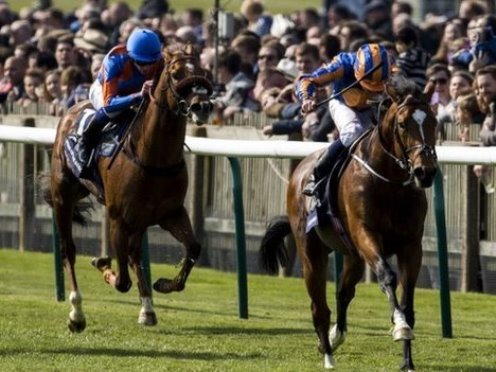
Gleneagles –
“The decision-making process around running plans for Ballydoyle’s top horses can be tortuous,” highlight Timeform in their ruminations on the numerous Gleneagles-related ‘will-he-won’t-he-run’ sagas that peppered the second half of the season. “No running plans are issued from Ballydoyle until they have been agreed by all the major partners – ‘the lads’ [as O’Brien refers to them] – which often leaves [the trainer] hedging his bets about future plans in post-race interviews (a process O’Brien describes as ‘trying to say something without saying anything’).”
One of the chief targets for both outfits will be the Epsom Oaks, won by O’Brien’s seeming third-string Qualify in 2015, but a race whose drop in value is noted by Timeform as being indicative of a decline in the Classic races, “its value in Britain having dropped in recent years below that of the British Champion Fillies’ and Mares’ Stakes and the Nassau Stakes”.
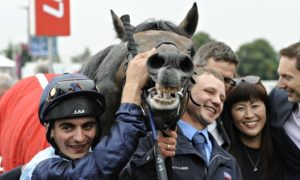 Another long-standing issue for the sport is that of the use of the whip which comes under scrutiny, this time in particular with regards to the King George winner Postponed, whose rider Andrea Atzeni was banned for six days for using his stick above the permitted level and also hitting winner down the shoulder.
Another long-standing issue for the sport is that of the use of the whip which comes under scrutiny, this time in particular with regards to the King George winner Postponed, whose rider Andrea Atzeni was banned for six days for using his stick above the permitted level and also hitting winner down the shoulder.
“The rules need to be flexible enough to fit individual cases and should place more emphasis on incorrect use of the whip, rather than how often it is used,” argue Timeform, who also controversially agree with those suggesting disqualification be among the sanctions available to raceday officials. “The stewards should be given the ultimate power – which they do not have at present – to disqualify horses in extreme cases of whip abuse as, for example, when Frankie Dettori struck Rewilding 24 times in the last two furlongs of the 2011 Prince of Wales’s Stakes.”
One point on which the majority in the sport can surely agree is Timeform’s assertion that “closer harmonisation of racing’s rules is needed as racing becomes increasingly international (there were more than a thousand British-trained runners on foreign soil in the latest season)”.
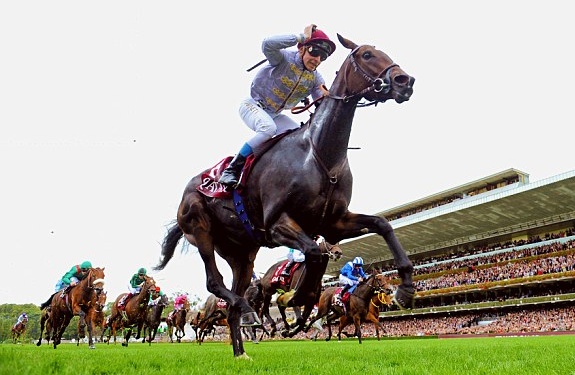
In their essay on the British St Leger winner, Simple Verse, Timeform state: “The International Federation of Horseracing Authorities is not responsible for staging racing’s major international occasions, such as the Breeders’ Cup and the Prix de l’Arc de Triomphe meeting, and can only advise and encourage from the sidelines (although, in that regard, it isn’t doing enough).
“A governing body such as Fifa, for example, which organises football’s World Cup, is in a position to implement changes to a set of rules that already apply worldwide. As with drug use, horse racing has no accepted worldwide set of rules governing interference and disqualification, inevitably leading to confusion and friction at times which affects the integrity of a sport that has become increasingly international.”
There are plenty of other subjects under scrutiny in the pages covering 10,980 individuals, with a useful section comprising Timeform’s famous ‘p’ horses, those horses thought likely to improve, and the ones given a capital ‘P’, those considered “capable of much better”.
The Newmarket trainer Luca Cumani can be relied on to plot profitable campaigns with middle distance handicappers and Laurence (97p) is one to watch out for on fast ground this summer while, if only for the name, Mitchum Swagger (115p) from the David Lanigan yard is another to note.
www.theguardian.com








